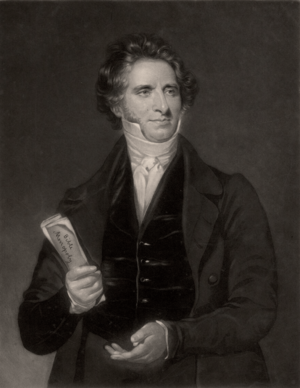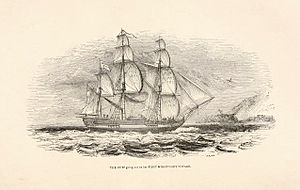John Campbell (19th-century minister) facts for kids
John Campbell (born 1795, died 1867) was a Scottish minister who led a church in London called the Moorfields Tabernacle. He followed in the footsteps of famous preachers like George Whitefield. John Campbell was also known for starting and editing several religious magazines, such as Christian Witness and British Banner.
Contents
Who Was John Campbell?
John Campbell was born in a town called Kirriemuir in Scotland. His father was a surgeon. John first worked at sea, then became a blacksmith in Dundee. In 1817, he had a strong religious experience. After this, he decided to study at the University of St Andrews and then the University of Glasgow.
Becoming a Minister
By 1823, John Campbell was preaching in Kilmarnock, Scotland. He even started a new church there. In 1827, he officially became a minister. This was done by important leaders of the Congregational Union of Scotland. In 1828, he preached for a short time at a chapel in London. His sermons were very popular. The next year, he was chosen to lead the Moorfields Tabernacle in London.
Fighting for Cheaper Bibles
John Campbell became very famous for trying to make Bibles more affordable. At that time, certain companies had a special right to print the Bible. This meant they were the only ones allowed to print it, which kept prices high.
The Bible Printing Monopoly
In England, a person called the King's Printer had this special right. In Scotland, this right changed in 1839. It went to a group called the Board for Bible Circulation. This group was led by a minister named Adam Thomson.
Adam Thomson strongly believed that Bibles should be cheaper. He worked with others to try and remove the special printing rights in England too. John Campbell joined him in this fight. They wanted everyone to be able to afford a Bible. Even though the special printing rights stayed, the price of Bibles did go down.
Speaking Up for Freedom
In May 1846, John Campbell supported a special event in London. This event was for Frederick Douglass, who had escaped slavery in America. Frederick Douglass spoke at a place called Finsbury Chapel.
Campbell's Powerful Words
When it was John Campbell's turn to speak, he said strong words. He talked about Frederick Douglass as a true man. He said his "blood boiled" thinking about the millions of enslaved people. Campbell believed people needed to hear more from Frederick Douglass. He wanted to see more action to help those who were enslaved.
A Leader in Religious Publishing
John Campbell became a very important figure in religious publishing. People even called him a "press baron." This means he had a lot of influence through the magazines and newspapers he worked with.
Building His Media Empire
He helped write for a newspaper called The Patriot. Later, he even owned it with someone else. In 1844, a group called the Congregational Union asked him to edit a monthly magazine called Christian Witness. The next year, he also started editing Christian's Penny Magazine.
In 1848, he took on editing a weekly newspaper called British Banner. During the 1850s, these publications had huge circulations, sometimes reaching 100,000 copies. This gave John Campbell a lot of power and influence. He used his magazines to discuss important religious ideas and sometimes even started debates.
Later Life and Legacy
John Campbell passed away at his home in St John's Wood Park on March 26, 1867. He is buried in Abney Park Cemetery in London. A book about his life and work was published that same year.
His Important Books
John Campbell also wrote several books. Here are some of them:
- Jethro (1839): This book talked about how regular church members could help spread the Gospel. It also discussed the Bible printing monopoly.
- Maritime Discovery and Christian Missions (1840): This book looked at how sea travel and Christian missions were connected.
- The Martyr of Erromanga (1842): This book was about the missionary John Williams, who died in 1839 while working in the Pacific.
- Memoirs of David Nasmith (1844): This book told the story of David Nasmith's travels and work.
Family Life
John Campbell was married twice. His first wife was Agnes Crichton, whom he married in 1827. They had three daughters and four sons. After Agnes passed away in 1857, John married Emma Anna Fontaine in 1866, near the end of his life.
 | Isaac Myers |
 | D. Hamilton Jackson |
 | A. Philip Randolph |



